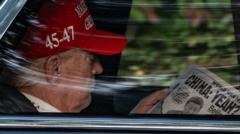**The introduction of new tariffs has led to significant stock market declines and widespread protests, with global leaders expressing concern over escalating trade tensions.**
**US Faces Economic Turmoil as Trump Calls for Patience Amid New Tariffs**

**US Faces Economic Turmoil as Trump Calls for Patience Amid New Tariffs**
**As the US implements a 10% tariff on imports, President Trump urges calm amidst market chaos and international backlash.**
The United States commenced a 10% "baseline" tariff on all imports on Saturday, prompting President Donald Trump to encourage citizens to "hang tough" in response to mounting economic instability. The move affects hundreds of countries, notably the UK and France, whose leaders have hinted that retaliatory measures could be on the agenda. China's economy, however, appears to be bearing the brunt of Trump's tariffs, leading to significant counteractions from Beijing.
On Friday, all three major US stock indexes plummeted over 5%, with the S&P 500 experiencing its most considerable drop since 2020, falling nearly 6%. Following the announcement of the tariffs, protests erupted in cities including Washington DC and New York, where thousands voiced their discontent over a range of Trump’s policies, from economic strategies to governmental cuts.
Trump characterized the turbulent market conditions as an "economic revolution," claiming that the United States "will win" in the end. He called for perseverance, stating, "Hang tough, it won't be easy, but the end result will be historic," in a post shared on Truth Social.
The repercussions from Trump's policy changes have resonated across global supply chains, with the UK's FTSE 100 index declining by almost 5%—the largest drop seen in five years. Asian markets mirrored this trend, while stock exchanges in France and Germany also faced sharp declines. Elon Musk, a prominent ally of Trump and head of the Department of Government Efficiency (Doge), suggested potential for a "zero-tariff situation," hinting at the possibility of establishing a free-trade zone encompassing Europe and North America.
Despite earlier opposition to a proposed free-trade agreement with the EU during his first term, Trump once again shifts the focus to tariffs, with plans to impose as much as 50% on certain "worst offenders." British Prime Minister Sir Keir Starmer engaged in discussions with global leaders following the announcement, highlighting the need for a collaborative approach, yet acknowledged that no options should be dismissed in the face of a trade war.
As China faces the harsh impact of Trump's tariffs, it has retaliated with its own 34% tariffs on US imports. Beijing also initiated a complaint to the World Trade Organization, calling for a cessation of the US's tariff policies that it claims undermine China's economic development rights.
In light of the situation, approximately 1,200 protests are anticipated across the US, marking an unprecedented day of dissent in response to Trump and Musk’s decisions since the White House announced alterations to the structure of US governance, particularly expanding executive branch powers. The White House has not yet released any statements in response to the widespread demonstrations, while President Trump was reported holding a New York Post article outlining concerns about China's trade practices.
The immediate impacts on trade are already becoming evident, as companies like Jaguar Land Rover have announced they will "pause" all shipments to the US in order to reassess the new trade conditions arising from these tariff changes.




















